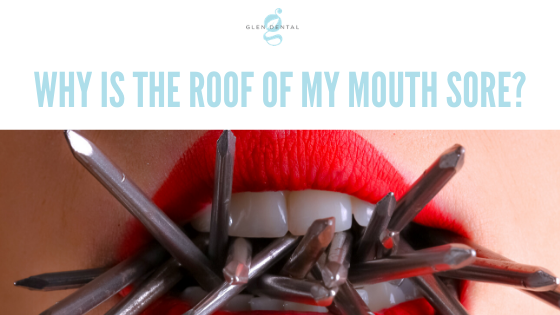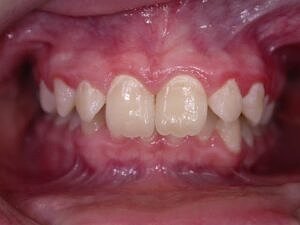REVIEWS LIVE FEED
Why is the roof of my mouth sore?

“Why is the roof of my mouth sore?” is a common question, there are a multitude of causes and this article will take a look at the most common causes you are likely to experience.
A very common question we hear, linked to soreness is…
Why is the top of the inside of the mouth wrinkly?
The inside of your mouth contains a series of folds called palatine rugae, but what are they for? From a biological perspective they are there to help the ball of food move around your mouth and help guide it towards the back of your mouth for swallowing.
Interesting fact: Did you know that the patterns of the palatine rugae have been used in criminal cases to identify unique individuals? Kind of like a dental fingerprint, who knew!
What causes the roof of your mouth to hurt when you eat?
There are 2 primary causes of pain in the roof of the mouth whilst eating:
- Burns.
- Malocclusion.
Burns
The roof of your mouth is very sensitive and can burn very quickly. Temperatures of more than 80°C will burn human tissue in less than a second – so be careful when eating or drinking anything hot.
Malocclusion
There is a reasonably common type of malocclusion where the teeth don’t meet together properly called a Class II Division 2 relationship. When viewed from the front this is where you can’t see the lower teeth because they bite up inside the top of the back teeth instead of meeting just behind the tips of the back teeth.

A normal front tooth biting relationship

A class II division 2 biting relationship
A result of the lower teeth biting so high up behind the top teeth is that they can actually touch the roof of the mouth causing sore roof of mouth behind front teeth, this is usually a chronic soreness rather than an acute soreness which heals quickly. If you think you may have this type of malocclusion please do speak to your dentist as there are a range of orthodontic options which can help.
Why does the roof of my mouth hurt after eating pizza?
This will almost certainly be caused by a burn. Your mouth is very sensitive with burns occurring at anything approaching 80°C, considering pizza contains lots of cheese and cheese melts at anywhere between 65°C and 82°C it’s not surprising that sometimes we get a burn if we eat pizza to quickly… The answer? Slow down and wait for the pizza to cool!
How long does it take a burn on the roof of your mouth to heal
If you have a severe burn then you should take immediate action to go to your local accident and emergency department, burnt tissue can swell and you need to ensure that you protect your airway so you can breathe.
For minor burns, whilst still painful, we recommend rinsing with water with a little salt added. The salt will work as a disinfectant to clean the area. Pain can be relieved with over-the-counter painkillers such as Ibuprofen. You may also decide to see an emergency dentist.
The roof of your mouth will begin to heal in a couple of days and you may even notice that after 2 days the pain has completely gone. Whilst it is healing make sure you allow food & drinks time to cool more than you would normally, this ensures you don’t aggravate any sore burnt area.
Why is the roof of a mouth yellow in colour?
The most common causes of a mouth looking yellow are:
- poor oral hygiene leading to a buildup of bacteria – a dentist will be able to help you sort out your oral health care routine
- a burn from eating food which was too hot
- medicine containing Pepto-Bismol – have a look at the label of any medicine you are taking
- smoking
- oral thrush – a Candida fungus, although this is usually white patches rather than yellow. If you believe this is the cause then please visit your doctor who will be able to do laboratory tests and prescribed the right treatment
I have sores on the roof of mouth, what can I do?
Typical conditions which cause sores on the roof of the mouth are:
- cold sores – caused by the herpes simplex virus, usually by contact from infected persons skin or body fluids. Further Information.
- anaemia – this may be a sign that your body is short of folic acid, iron or vitamin B12. Further Information.
- gingivomatitis – a reasonably common infection, particularly in children caused by a viral or bacterial infection, often as a result of poor oral hygiene. Sores usually disappear in a couple of weeks with no treatment. Further Information.
- canker sore, also called aphthous stomatitis or aphthous ulcers – Affecting approximately 20% of the population, they are not infectious and are not linked to cold sores. They usually last 10 to 14 days and heal without treatment, although they can be painful.
- folate deficiency – this is a type of anaemia caused by lack of the B vitamin, folic acid. It results in a condition known as megaloblastic anaemia where the red blood cells are larger than normal. Diagnosis is made via a blood test and treatment can include injections and diet analysis.
- oral thrush – this is usually a harmless yeast infection most commonly in babies and young children or anyone with a weakened immune system.
- leukoplakia – this is often caused by smoking and is characterised by thick white patches which form on the inside of your mouth, gums and cheeks. The patches can look quite scary although they are usually noncancerous.
- oral lichen planus – this is a chronic inflammatory condition of the inside the mouth characterised by white patches often with a lacy look to them. The tissues can also become red, swollen and susceptible to sores. The areas can be quite painful with burning sensations, this is often exacerbated by spicy foods. If the condition needs to be treated then usually a corticosteroid treatment is required.
- mouth cancer (oral cancer) – this is the one that many people are most concerned about, it is however very rare and if caught early is extremely treatable. Symptoms include mouth sores and ulcers which persist, pain in the throat (a sore throat) or neck or red patches which persist in the mouth and don’t heal. Your dentist will always undertake a mouth cancer screening at every 6 month appointment, this is one of the reasons you should always visit your dentist regularly to ensure this screening appointment occurs.
It’s also worth pointing out that there is a condition called burning mouth syndrome, whilst this doesn’t usually manifest as sores it can be a painful syndrome where people complain of a burning or scalding sensation in the mouth. More women than men seem to be prone to the condition being prevalent after the age of 60. Further information can be found here.
Summary
We hope you found this blog post about mouth sores and ulcers interesting, it’s important to note that whilst many people worry about the more sinister conditions, most causes are benign in nature and can be quickly and simply treated. If you are concerned about any mouth ulcer or sore please do visit your dentist and ensure you keep up with your 6 monthly dental health consultations to ensure you are screened regularly.
- How Long Does A Dental Bridge Last? - 26th February 2022
- Is Botox Used For Face Wrinkle Reduction? - 5th February 2022
- What You Need To Know For Dermal Filler Aftercare? - 4th January 2022






